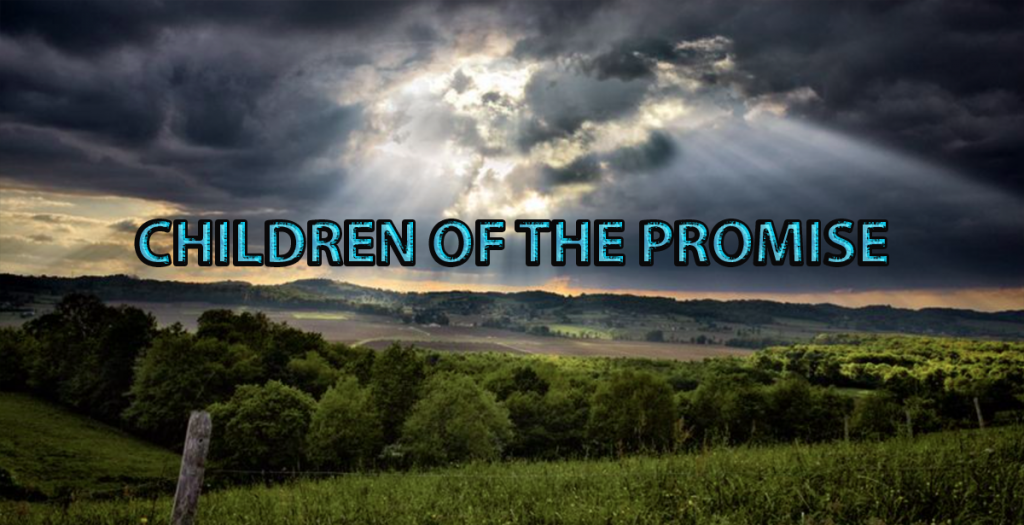CHILDREN OF THE PROMISE
Opening Prayer
Spirit of the living God, fall afresh on me. Release within me praise, power, and a great sense of your presence.
Scripture Reference
ROMANS 9:6-18
Read
God’s Sovereign Choice
6 It is not as though God’s word had failed. For not all who are descended from Israel are Israel. 7 Nor because they are his descendants are they all Abraham’s children. On the contrary, “It is through Isaac that your offspring will be reckoned.”[a] 8 In other words, it is not the children by physical descent who are God’s children, but it is the children of the promise who are regarded as Abraham’s offspring. 9 For this was how the promise was stated: “At the appointed time I will return, and Sarah will have a son.”[b]
10 Not only that, but Rebekah’s children were conceived at the same time by our father Isaac. 11 Yet, before the twins were born or had done anything good or bad—in order that God’s purpose in election might stand: 12 not by works but by him who calls—she was told, “The older will serve the younger.”[c] 13 Just as it is written: “Jacob I loved, but Esau I hated.”[d]
14 What then shall we say? Is God unjust? Not at all! 15 For he says to Moses,
“I will have mercy on whom I have mercy,
and I will have compassion on whom I have compassion.”[e]
16 It does not, therefore, depend on human desire or effort, but on God’s mercy. 17 For Scripture says to Pharaoh: “I raised you up for this very purpose, that I might display my power in you and that my name might be proclaimed in all the earth.”[f] 18 Therefore God has mercy on whom he wants to have mercy, and he hardens whom he wants to harden.
Footnotes
- Romans 9:7 Gen. 21:12
- Romans 9:9 Gen. 18:10,14
- Romans 9:12 Gen. 25:23
- Romans 9:13 Mal. 1:2,3
- Romans 9:15 Exodus 33:19
- Romans 9:17 Exodus 9:16
New International Version (NIV)Holy Bible, New International Version®, NIV® Copyright ©1973, 1978, 1984, 2011 by Biblica, Inc.® Used by permission. All rights reserved worldwide.
Meditate
Consider
‘Long my imprisoned spirit lay / fast bound in sin and nature’s night … I woke, the dungeon flamed with light.’1 Has your understanding of God ever changed radically?
Think Further
How had the Jews gotten it so wrong about Jesus that they rejected him? Paul knew from bitter personal experience where they had taken a wrong turning. After years spent persecuting Christians, it was only when he actually met Jesus that the penny dropped.2 To the Jews, the two things that mattered were being descended from Abraham and being circumcised – these signified the people included in the promise. Jesus had challenged that: not all of Abraham’s descendants were his children.3
So, had God’s plan gone wrong? Was that why so many Jews rejected Jesus? Of course not, says Paul. Not all Abraham’s offspring were God’s children (v 8). The child of the promise was Sarah’s son (v 9), not Ishmael. And what about the next generation? Isaac and Rebekah had twin sons, Jacob and Esau, but the line of promise came through Jacob, the younger not the older. This was nothing to do with Jacob’s character or behavior: it was God’s choice before they were born (vs 11,12). Despite what the Jews believed, natural descent and circumcision were not what counted with God.4 Being a true Jew was an inward thing, a matter of the heart.
Paul now faces a second question: does this mean that God is unjust (v 14)? Why has he chosen some but not others? The real issue is not judgment, which we all deserve. Instead, God deals with us in salvation based on mercy (vs 15,16). Nevertheless, by resisting God we can harden our hearts, as did Pharaoh (v 17).5 Ultimately, ‘The wonder is not that some are saved and others not, but that anybody is saved at all.’6 Even more remarkable is the fact that Gentiles are, like Isaac, children of promise.7
Apply
Praise God that those – like us, maybe – who seemed to be outside God’s promise have been brought inside.
Closing Prayer
Heavenly Father, you are the one who shapes time and space, and yet you lend your attention to me. I praise you for your mercy.
1 Charles Wesley, 1707–88, ‘And can it be’ 2 Acts 26:13–19 3 John 8:39 4 Rom 2:28 5 Exod 9:12,16 6 John Stott, Romans, IVP, 1994, p269 7 Gal 4:28
Book and Author Intros
Last Updated on August 20, 2022 by kingstar

